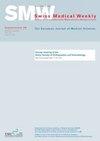The funding of specialised paediatric palliative care in Switzerland: a conceptualisation and modified Delphi study on obstacles and priorities
IF 2.1
4区 医学
Q2 MEDICINE, GENERAL & INTERNAL
引用次数: 0
Abstract
BACKGROUND: Effective funding models are key for implementing and sustaining critical care delivery programmes such as specialised paediatric palliative care (SPPC). In Switzerland, funding concerns have frequently been raised as primary barriers to providing SPPC in dedicated settings. However, systematic evidence on existing models of funding as well as primary challenges faced by stakeholders remains scarce. AIMS: The present study’s first aim was to investigate and conceptualise the funding of hospital-based consultative SPPC programmes in Switzerland. Its second aim was to identify obstacles to and priorities for funding these programmes sustainably. METHODS: A 4-step process, including a document analysis, was used to conceptualise the funding of hospital-based consultative SPPC programmes in Switzerland. In consultation with a purposefully selected panel of experts in the subject, a 3-round modified Delphi study was conducted to identify funding-relevant obstacles and priorities regarding SPPC. RESULTS: Current funding of hospital-based consultative specialised paediatric palliative care programmes is complex and fragmented, combining funding from public, private and charitable sources. Overall, 21 experts participated in the first round of the modified Delphi study, 19 in round two and 15 in round three. They identified 23 obstacles and 29 priorities. Consensus (>70%) was obtained for 12 obstacles and 22 priorities. The highest level of consensus (>90%) was achieved for three priorities: the development of financing solutions to ensure long-term funding of SPPC programmes; the provision of funding and support for integrated palliative care; and sufficient reimbursement of inpatient service costs in the context of high-deficit palliative care patients. CONCLUSION: Decision- and policy-makers hoping to further develop and expand SPPC in Switzerland should be aware that current funding models are highly complex and that SPPC funding is impeded by many obstacles. Considering the steadily rising prevalence of children with life-limiting conditions and the proven benefits of SPPC, improvements in funding models are urgently needed to ensure that the needs of this highly vulnerable population are adequately met.瑞士儿科姑息治疗专业化的资金来源:关于障碍和优先事项的概念化和修改后的德尔菲研究
背景:有效的筹资模式是实施和维持儿科专科姑息治疗(SPPC)等重症护理项目的关键。在瑞士,资金问题经常被认为是在专门环境中提供SPPC的主要障碍。然而,关于现有筹资模式以及利益攸关方面临的主要挑战的系统证据仍然很少。目的:本研究的第一个目的是调查和概念化瑞士以医院为基础的SPPC咨询方案的资金。第二个目标是确定可持续地为这些方案提供资金的障碍和优先事项。方法:采用包括文件分析在内的4个步骤的过程,对瑞士以医院为基础的SPPC咨询方案的供资进行了概念化。在与有目的选定的专家小组协商后,进行了3轮修正德尔菲研究,以确定与SPPC相关的资金障碍和优先事项。结果:目前以医院为基础的咨询专业儿科姑息治疗方案的资金是复杂和分散的,包括公共、私人和慈善来源的资金。总的来说,21位专家参加了第一轮的修正德尔福研究,19位参加了第二轮,15位参加了第三轮。他们确定了23个障碍和29个优先事项。对12个障碍和22个优先事项的共识(>70%)。在三个优先事项上达成了最高程度的共识(>90%):制定融资解决方案,以确保为SPPC方案提供长期资金;为综合姑息治疗提供资金和支持;在高赤字姑息治疗患者的背景下,充分报销住院服务费用。结论:希望在瑞士进一步发展和扩大SPPC的决策者应该意识到,目前的资助模式非常复杂,SPPC的资助受到许多障碍的阻碍。考虑到患有生命限制疾病的儿童的患病率稳步上升以及SPPC已被证实的益处,迫切需要改进供资模式,以确保充分满足这一高度脆弱人群的需求。
本文章由计算机程序翻译,如有差异,请以英文原文为准。
求助全文
约1分钟内获得全文
求助全文
来源期刊

Swiss medical weekly
医学-医学:内科
CiteScore
5.00
自引率
0.00%
发文量
0
审稿时长
3-8 weeks
期刊介绍:
The Swiss Medical Weekly accepts for consideration original and review articles from all fields of medicine. The quality of SMW publications is guaranteed by a consistent policy of rigorous single-blind peer review. All editorial decisions are made by research-active academics.
 求助内容:
求助内容: 应助结果提醒方式:
应助结果提醒方式:


